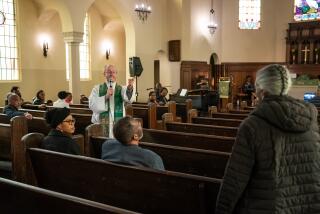At Church, an ‘ATM for Jesus’
- Share via
AUGUSTA, Ga. — Pastor Marty Baker preaches that the Bible is the eternal and inviolate word of God. On other church matters, he’s willing to change with the times.
Jeans are welcome at Stevens Creek Community Church, the 1,100-member evangelical congregation Baker founded 19 years ago. Sermons are available as podcasts, and the electric house band has been known to cover Aerosmith’s “Dream On.” A recent men’s fellowship breakfast was devoted to discussing the spiritual wages of lunching at Hooters.
It is a bid for relevance in a nation charmed by pop culture and consumerism, and it is not an uncommon one. But Baker has waded further into the 21st century than most fishers of American souls, as evidenced one Wednesday night when churchgoer Josh Marshall stepped up to a curious machine in the church lobby.
It was one of Stevens Creek’s three “Giving Kiosks”: a sleek black pedestal topped with a computer screen, numeric keypad and magnetic-strip reader. Prompted by the on-screen instructions, Marshall performed a ritual more common in quickie marts than a house of God: He pulled out a bank card, swiped it and punched in some numbers.
The machine spat out a receipt. Marshall’s $400 donation was routed to church coffers before he had found his seat for evening worship.
“I paid for gas today with a card, and got lunch with one,” said Marshall, 30. “This is really no different.”
Baker came up with the kiosk idea a couple of years ago. He had just kicked off a $3-million building drive, but noticed that few people seemed to keep cash in their wallet anymore for the collection bag.
So he began studying the electronic payment business. He designed his machine with the help of a computer programmer who attends Stevens Creek, and found ATM companies willing to assemble it for him. In early 2005, he introduced the first machine at his church.
Since then, kiosk giving has gradually gained acceptance among his upper-middle-class flock. The three kiosks are expected to take in between $200,000 and $240,000 this year -- about 15% of the church’s total donations.
“It’s truly like an ATM for Jesus,” Baker said.
This summer, Baker and his wife, Patty, began selling the devices to other churches through their for-profit company, SecureGive. They are its only employees, but a handful of contractors help them custom-tailor the machines for churches.
The kiosks can let donors identify their gift as a regular tithe or offering, or direct it to building or missionary funds. The machines send information about the donation to a central church computer system, which shoots the donors an e-mail confirmation.
The Bakers charge between $2,000 and $5,000 for the kiosks, which come in a variety of configurations. They also collect a monthly subscription fee of up to $49.95 for licensing and support. And a card-processing company gets 1.9% of each transaction; a small cut of that fee goes to SecureGive.
So far, seven other congregations have installed or ordered the machines. All of them are Protestant, and most are in the South. If the idea takes off and makes the Bakers rich, Patty says they will thank the Lord -- and give a significant sum to their church.
The concept is in its infancy, but it is part of a broader attempt among houses of worship to boost donations using modern technology. Among the most popular are “e-tithing” systems, which allow churchgoers to set up automatic contributions from their bank accounts -- much as they would their Netflix dues.
But Baker -- a 45-year-old preacher who grew up in the Pentecostal churches of South Carolina -- sees a more dramatic change afoot in the culture of church giving, as Americans increasingly turn to plastic for their everyday expenditures. That has certainly been true outside of church: Six years ago, debit cards were used in 21% of in-store transactions; today they account for a third of them, according to the American Bankers Assn.
At church services, Baker said, the next few years could be comparable to another upheaval centuries ago, when offerings of grain and animals were replaced with what was then the newfangled medium of money.
“I’ll bet that caused a stir, too,” he said, chuckling.
Baker assumes many churches are not yet ready to change. The need to generate earthly revenue can be a sensitive topic for the clergy; lampooning their less subtle solicitations has been a sport for generations of critics, from Chaucer to heavy-metal bands.
The Bakers have heard naysayers at trade shows mutter disapproval of the kiosks: Some church leaders apparently fear that a technology so closely associated with commerce might come across as crass.
“Not in our church,” Baker recalls one group saying as they passed a SecureGive display.
Those kinds of reservations emerged in Baton Rouge, La., before Baker went into business. About three years ago, the Roman Catholic diocese there worked with a Canadian company to produce a machine that would accept bank card donations from churchgoers. Church officials hoped to place it in the Cathedral of St. Joseph, an imposing Gothic Revival building near the banks of the Mississippi River that dates to the 1850s.
It’s not an Aerosmith kind of place. Church officials eventually changed their minds.
“I think that when it actually came time to put a kiosk in the back of a cathedral, it just wasn’t quite, well -- I’d like to say ‘kosher,’ but we’re Catholic,” said Mark Blanchard, the stewardship director for the diocese.
When the board of Ginghamsburg United Methodist Church considered buying one of Baker’s machines more recently, the issues were both generational and doctrinal. Nate Gibson, chief financial officer of the Tipp City, Ohio, church, is 25 and reckons he’ll live to see a post-cash society. He was an early fan of the kiosk. But it took a vigorous debate before older members of the church board decided it was appropriate.
The board had another concern: The kiosk accepted both debit and credit cards, and Ginghamsburg advises its members to avoid credit card debt. So the Bakers said they would tweak the machine to accept only debit cards.
Ginghamsburg’s machine was delivered late last week, and Gibson expects it to be rolled out for use in the next few days. He said that with 5,000 weekly visitors to the church, his only regret may be that he didn’t order two: Debit cards hardly seem like a passing fad.
“Things are not going backward,” Gibson said. “We’re not going to sit here in 10 years and say, ‘Dang, we shouldn’t have put in a debit card machine because no one’s using them anymore.’ ”
The churches that have installed the machines are noting the changes in the way people give. At Family Church, an evangelical congregation of 700 in West Monroe, La., some members choose the kiosk because they can earn bonus airline miles when they charge their donations, accountant Kristi Young said.
At Stevens Creek, volunteers such as Jeff Asselin still pass around the wooden-handled collection bag. But Asselin said it is considerably lighter these days -- although some people who donate at the kiosk drop their receipts in the bag as a vestige of the old ways.
“The Bible talks about bringing your offerings to the church, and they like the feeling of dropping their offering in the plate,” Patty Baker said. “And we also believe that your offering is part of worship, so that’s how they participate.”
Asselin and his wife normally donate to the church by writing a check. But he said they had been experimenting with the kiosk -- and modifying their traditions accordingly. In the past, they would pray over their check together, asking God to ensure it is used for good works. Now those prayers are offered in the glow of the kiosk monitor.
At the Wednesday service, 27-year-old Sally Rice chose the traditional method of giving. As a Gap Kids store manager, she’s more familiar than most with the way debit and credit cards work. But she hasn’t made the switch at church.
“I still balance my checkbook the old-school way -- I write it all down,” she said.
Rice, however, said she had no qualms about the machine itself. She said she might make the switch when she runs out of checks. “I think it’s cool.”
The Bakers figure most people will give up on checks before they give up on their faith. The question is whether churches will adapt.
If they do, the Bakers say they will be ready with their next idea: donation machines that attach to the backs of pews.
*
More to Read
Sign up for Essential California
The most important California stories and recommendations in your inbox every morning.
You may occasionally receive promotional content from the Los Angeles Times.










